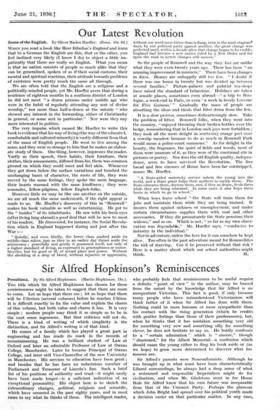Our Latest Revolution
Some of the English. By Oliver Madox Hueffer. (Benn. 10s. 6d.) WHEN you read a book like Herr Dibelius's England and learn that to a German the English are this, that or the other, you
feel inclined very likely (I know I do) to object a little im- patiently that there are really, no English. What you mean is that no nation consists of people so much alike that they can be generalized, spoken of as if their social customs, their mental and spiritual reactions, their attitude towards problems of existence were pretty much the same all through.
We are often told that the English are a religious and a
politically-minded people, yet Mr. Hueffer avers that during a residence of eighteen months in a southern district of London he did not meet " a dozen persons under middle age who were in the habit of regularly attending any sort of divine
worship," nor more than half-a-dozen at the outside " who showed any interest in the forwarding, either of Christianity in general, or some sect in particular.". Nor were they any more interested in politics.
The very impulse which caused Mr. Hueffer to write this book is evidence that his way of living (the way of the educated, comfortable and cultured minority) is vastly different from that of the mass of English people. He went to live among the mass, and they were so strange to him that he makes an elabor-
ate study of them. One thing, however, impresses the reader. Vastly as their -speech, their habits, their furniture, their clothes, their amusements, differed from his, there was common
ground on which they could meet and feel akin. Whenever they got down below the surface variations and touched the unchanging bases of character, the roots of life, they were moved by the same feelings, they spoke the same language, their hearts warmed with the same kindliness ; they were comrades, fellow-pilgrims, fellow English-folks.
However little we may be like one another on the outside, we are all much the same underneath, if the right appeal is made to us. Mr. Hueffer's discovery of this in "Romwell" makes his book valuable as well as entertaining. He got to the " insides' of its inhabitants. He saw with his fresh eyes
(after living long abroad) a good deal that will be new to most Of his.readeri. }rediscovered, for instance, the Social Revold- tion which in England happened during and just after the
War
Quietly, and even kindly, the lower class pushed aside its Middle-class rulers, just as they in an earlier day thrust aside the aristocracy ; peacefully and gently it possessed itself, not only of a higher standard of living, as expressed in gramophones or motor- bicycles, but for good or ill, of actual place and power. Without the shedding of a drop of blood, without injustice or oppression,
without one word more bitter than is flung, even in the most stagnant days, by one political party against another, the great change was perfected Until, within a decade after that change began to be visible, England liad become a new nation ruled by a New Order and far upon the road to newer changes still unseen."
So the people of Romwell and the way they live are unlike what they were even twenty years ago. There has been " an amazing improvement in manners." There have been changes in dress. Homes are unhappily still too few. " I doubt if there was one house in twenty but was divided up between several families." Picture-palaces and palatial tea-shops
have raised the standard of behaviour. Holidays are taken at seaside places, sometimes even abroad—" a trip to Bou- logne, a week-end in Paris, or even ' a week in lovely Lucerne for Five Guineas.' " Gradually the mass of people are absorbing the ideas and ideals that filter down from the few.
It is a slow process, sometimes dishearteningly slow. Take the problem of litter. Romwell folks, when they went into the country, " enjoyed throwing their broken bottles over the hedge, remembering that in London such joys were forbidden ; they took all the more delight in scattering orange peel over a cowslip meadow because to do as much in Romwell Park would mean a police-court summons." As for delight in the beauty, the fragrance, the quiet of fields and woods, most of them were unaware of it, as they were of the emotional stir in pictures or poetry. Nor does the old English quality, indepen- dence, seem to have survived the Revolution. The free bread and free circuses of Rome hive been far outstripped, muses Mr. Hueffer.
" A State-aided maternity service ushers the young into the world, and a State grant helps their mothers to suckle them. The State educates them, doctors them, and, if they so desire, feeds them while they are being educated. In some cases it also buys them boots in which to go to school."
When boys leave school " the State will train them for jobs and maintain them while they are being trained. It insures them against sickness or unemployment, and under certain circumstances supplies them with coal and other necessaries. If they die prematurely the State pensions their
widows," and so on. Which is not, " so far as my own obser- vation was dependable," Mr. Hueffer says, " conducive to industry in the individual."
Nor to adventure, unless the love for it can somehow be kept alive. Too often in the past adventure meant for Romwellites the risk of starving. Can it be preserved without that risk ?
Here is a matter about which our school authorities might








































 Previous page
Previous page